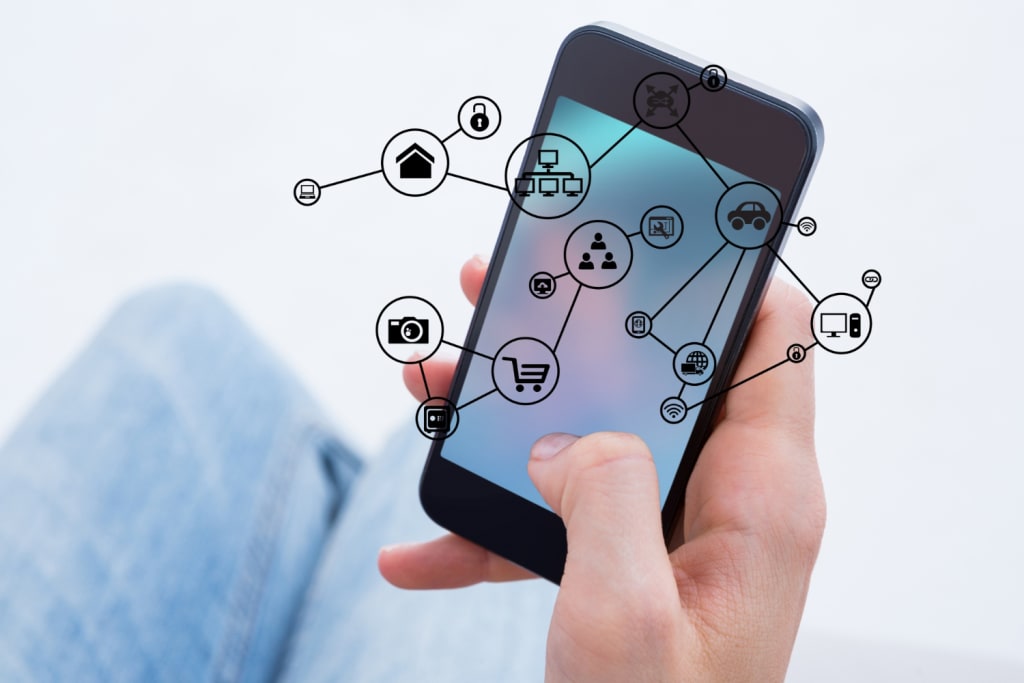IoT And Mobile App Integration: Impact, Benefits, And Challenges
In this blog, we are focusing on a few advantages, challenges, and impacts that IoT is making on the mobile app market. Read the blog to know everything.

By 2022, mobile apps and IoT have paired up to explore endless possibilities of the tech market. From enabling a smooth wireless controlling and inspection network to improving the quality of products and services, IoT and apps have already done wonders together.
Today, IoT-supported mobile apps are useful for controlling smart appliances such as smartphones, ACs, speakers, and more. Apart from that, developers have also found ways of leveraging IoT technology to provide users with more personalized healthcare assistance.
According to a Statista report, as of 2023, in the global market, IoT spending was expected to cross a threshold of $1.1 trillion before Covid. However, now the growth is projected to slow down a little due to the pandemic. Yet, with new innovations of technology like Metaverse, IoT and mobile apps are finding new ways to expand their growth across markets.
Impact of IoT on mobile apps
Now, before discussing a few benefits and challenges that IoT technology has created for mobile apps, let’s throw some light on the impact that it has brought.
Boosting the culture of hybrid apps
IoT has made it possible for mobile apps to onboard multiple devices and platforms without having to be written multiple times. UI and UX of hybrid apps are quite adjustable and adapt to new environments very easily.
Centralizing mobile apps
Centralized mobile apps can be useful to control multiple appliances. Thus, with the help of open-source codes that appliances manufacturers have started publishing more often, centralized apps are seeing a rise in their development.
Promoting the VR culture
Virtual reality (VR) was a demanding technology a few years back and thus, it mainly had to be paired up with technologies such as consoles. But now, VR is able to onboard mobile app experiences due to IoT advancements in sensors used for smartphones.
Making remote control more efficient
IoT and mobile apps are pairing up to turn out to be more efficient in terms of controlling devices remotely. One app can be used to control smart appliances with the help of voice commands or buttons from the app.
Benefits of IoT mobile apps
If you do not know how does the Internet of Things work, let us give you an idea in short. The technology uses IoT sensors to transfer data between devices. This data is used to establish communication and control between devices. Furthermore, we are discussing a few benefits of IoT and mobile apps when they are paired up together.
1. Enhanced security
IoT-supported mobile apps offer better security as IoT sensors are used to generate alert on mobile apps to alert the user in real-time. For instance, if your home is equipped with smart security devices that support apps, then anytime a security breach is detected or attempted, you will receive an instant alert on your smartphone with a live feed. Some apps even alert nearby authorities for a quicker response even when you are occupied with something else.
2. Elimination of location-based dependency
One of the major benefits of IoT is the independence that consumers get. Even if you forgot to switch off a smart light or left the TV turned on, you can always control it with a simple app. Thus, the freedom from being at the same location is a priceless benefit that humans get with IoT apps.
3. Increasing adaption of open-source codes
Manufacturers that build smart devices with IoT sensors most of the time publish their open-source codes on platforms like Github. These open-source codes give new developers the freedom to build and learn apps that can support devices. To improve the quality of outcomes, using open-source codes to build that support real products is very beneficial.
4. Enhanced culture of on-demand services
Some services such as healthcare require immediate attention in many cases. However, a few years back, monitoring patients that needed more attention was very expensive and limited in terms of resources. But now, with IoT sensors, a simple smartwatch can be used to track pulses, location, and more of the patient. On top of that, with the addition of technologies such as AI, these smart devices can also generate an alert to attract immediate attention if needed.
Challenges in IoT mobile apps
After discussing impacts and benefits, it is crucial to throw some light on the challenges that might occur if the planning is not properly implemented to establish such wireless networks.
1. Vulnerability to cyberattacks
IoT networks usually are connected with more than one device. Thus, each device has to be continuously monitored in order to ensure that there are no possible vulnerabilities that can cause cyberattacks or hardware failures. Cyber attackers usually leverage these opportunities to enter into databases.
2. Increased costs
As mentioned above, continuous monitoring of connected devices is crucial. Thus, technologies such as AI and machine learning are used to make that possible. Bringing such technologies into the picture means hiring specific experts that know how to handle them. In the end, the ultimate cost is increased and if the return does not justify the cost plus profit, the adaption of IoT is not worth it.
3. Limitation of battery life
Smartphones usually are equipped with less capacity for battery power. However, IoT apps use multiple hardware and software sets to run. Eventually, the battery consumption is increased and battery life is reduced. In devices with lesser configurations, performance issues can also occur.
Wrapping up
IoT is an evolving technology. And with time, as smartphones are witnessing regular hardware upgrades, it will be easier to get more IoT advantages onboard on smart devices. Right now, some high-end tasks such as console gaming have already onboarded the smartphone market with the help of cloud gaming apps. These apps use IoT, the internet, and AI to optimize games and make them accessible on smartphones.





Comments
There are no comments for this story
Be the first to respond and start the conversation.